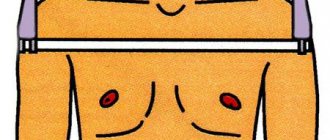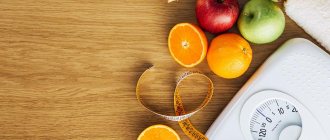A common problem that many girls face. Spoiler: it needs to be solved as a whole. All methods are simple - read the material and choose yours.
The human body contains about 60% water, which is important for all biological processes. It is recommended to consume a sufficient amount of liquid every day - about 2.0-2.5 liters. But many people note water retention, which causes weight gain and swelling. We give detailed instructions on how to remove fluid from the body quickly.
Swelling or excess water: what's the difference?
Correcting body weight by removing excess fluid is necessary for professional athletes and bodybuilders, for whom it is important to meet a certain weight category or improve their appearance.
Excessive water retention, which forms edema, is another problem. Although in most cases they are harmless, persistent swelling can be a symptom of serious medical conditions such as heart, liver or kidney disease. Women experience fluid retention during the luteal phase of the menstrual cycle and during pregnancy.
Our material contains advice for healthy people and athletes. If you have severe swelling in your legs or arms, see your doctor. It is important to exclude kidney pathologies and serious endocrine metabolic diseases.
Regular exercise
This is one of the best ways to reduce weight quickly and safely. Any form of exercise increases sweating, which means the body loses water. The average fluid loss during one hour of training is 0.5-2 liters per hour, depending on the temperature in the room and clothing. During exercise, the body also transfers water to the muscles. This helps reduce the amount of fluid under the skin, improving the appearance and eliminating pastosity (swelling of the subcutaneous tissue).
When worrying about how to remove excess fluid from the body, we must not forget about adequate water consumption during exercise. Otherwise, serious dehydration may occur and you will feel worse. A sauna helps increase moisture loss and eliminate swelling. It activates sweating with fluid loss through the skin. If you go to the sauna after class, the effect will increase.
Why you shouldn't weigh yourself every day
What a pity that we gain much knowledge only through experience. This is especially true for losing weight. We follow the same weight loss paths, get the same bumps, make the same mistakes.
When something is very important to us, it is so difficult to distract ourselves from it for even a second. We devote almost all our thoughts to one goal. In the morning, afternoon, evening, there is only one thing in my head: “I wish I could lose weight quickly!” And we impatiently weigh ourselves almost hourly, hoping to see serious results. But the experience that we often lack tells us the opposite: you can only weigh yourself once a week, or better yet, twice a week!
Experienced losers have learned this truth through trial and error. Let's explain the reasons and find out why you shouldn't weigh yourself every day .
Physiological reasons
Even with serious efforts in losing weight, the scale can show not only a loss of weight, but even an increase in it. This is due to our physiology.
The female body is designed in such a way that on certain days of the month you will see weight gain. Weight gain is associated with fluid retention in the body before critical days. Depending on the individual characteristics of the body, this condition can last from 2 days to a week.
Fluid in the body can be retained for other reasons - food. For example, you couldn’t resist eating something spicy or salty. Not only will this cause you to drink a lot of water, but it, bound by sodium, will not be able to leave the body. Fried foods are also at risk of causing swelling. It would seem that you ate nothing at all, few calories - but your weight increased!
If you play sports, then keep in mind: during exercise, fats melt, but muscles grow and gradually become heavier. It turns out to be a kind of replacement in terms of weight. Therefore, there may not be plumb lines. Or the results will be less than expected.
Alcohol does amazing things to our bodies. In itself, it is not a high-calorie product. But even if you drink it almost dry or with a low-calorie snack, the result for tomorrow will surprise you. It happens that even after one such gathering, a girl is horrified to discover 2 extra kilos. It is very difficult to lose these kilograms later.
So it turns out: fat is consumed, you lose weight, and the scales lie to you, counting everything in one pile - both muscle mass and retained fluid.
Psychological reasons
Of course, if you weigh yourself every day, these weight fluctuations can drive a girl to despair. After all, it is impossible to take into account all the individual characteristics of the body from the first days of losing weight; this understanding is given with time and experience.
It is clear that frequent weighing will make someone losing weight become despondent. But grown-up girls don’t cry because of failures—they eat from them. In a situation where they give up, many give up further attempts, considering them useless. And the weight continues to grow.
The hardest thing is that self-confidence disappears. The girl thinks that she is not capable of anything, that she will not succeed anyway. Although in reality this is not the case.
Nobody loses weight just like that, everyone wants to achieve something thanks to being slim: the envy of a rival, career success, the admiration of others, the love of a man. If plans to stay slim fail, it means that a cherished dream collapses... And instead of losing weight, the girl becomes depressed, eats even more and gets fatter. That's why you shouldn't weigh yourself every day.
How to weigh yourself correctly
If you are just starting on the path to slimness, don’t let the scale be an important argument for you. Designate only one day a week on which you will step on the scale (not Monday). Be sure to take a measuring tape and measure your body parameters. Often this indicator is more objective than Libra Libra. It is advisable to do these procedures in the morning on an empty stomach or at any other time (the same thing), but with an empty stomach and preferably after going to the toilet. Let us remind you once again: you should not weigh yourself every day.
That's all. The rest will come with time and patience.
Good luck with your weight loss!
Getting enough sleep
Scientists have proven that adequate sleep is important for metabolism, along with physical activity and diet.
During sleep, the sympathetic nervous system activates the kidneys, which regulate the amount of sodium and fluid in the tissues. Adequate sleep regulates fluid levels and reduces water retention by subcutaneous tissue. On average, you need to sleep about 7-9 hours a day.
4mama
So is Libra a helper or the worst enemy of all girls in pursuit of an ideal figure? And why can’t we all stop constantly weighing ourselves, even if we are happy with the weight?
4mama understood these issues.
Why do we weigh ourselves?
The most important and obvious reason why we step on the scale is to know our weight. Or rather, have we gained weight or lost weight? As you know, with proper weight loss, a person’s weight decreases by an average of 1 kg per week. This pace is safe for the body, and we lose weight evenly. Accordingly, there is no need to weigh yourself more than once a week, since a fluctuation of a certain number of grams will be uninformative.
But some girls become so dependent on the scale that they check their weight every day, or even several times a day. This is already a psychological problem. And not even from losing weight, but rather from the desire to see a more pleasant number.
What should you do to get rid of
from addiction to constantly weigh yourself?
To begin with, set yourself a goal - how many kilograms you want to lose weight and how much time you allocate for it. Next, deal directly with the process of losing weight: review your diet, play sports. Be sure to weigh yourself before you start losing weight. Then do this every week. Set yourself a specific day and even time when you will step on the scale and follow this schedule. Don't deviate from it or change it. A routine and habit are needed in everything, even in weighing. It is best to step on the scale in the morning, immediately after you wake up and before eating. At this time of day, the body shows the correct weight.
Don't weigh yourself after exercising or after eating. You, of course, can see the figure a little more or less than the morning one, but do not forget that everything we consume during the day is still processed and absorbed. Therefore, there is no need to rely on this figure.
Stress Reduction
Constant stress increases the concentration of the hormone cortisol in the blood plasma. One of its effects is water retention in tissues, which causes swelling. This is because the stress hormone stimulates the activity of ADH (antidiuretic hormone), which retains fluid. The basis of the work of ADH is signals to the kidneys about salt retention, which automatically provokes retention - less urine is released, water remains in the tissues and subcutaneous tissue.
Eliminating stress helps normalize the functioning of ADH, relieves its negative effects on the kidneys, allowing urine to be produced more actively, removing excess moisture.
My light, scales, tell me and tell me the whole truth: how to weigh yourself correctly
For many, the scale is their biggest nightmare, especially at a time when most of us are returning from vacation. The weighing process is identified with climbing the “guillotine”, since the fear of the end result (gaining the hated kilograms) leads to depression, killing the desire to live (or at least to glue one’s mouth shut).
With a little courage, you can take the plunge, step on the scale and face reality. However, when weighing yourself, be careful not to make some common mistakes that most people make.
1. Weigh in after training
Did you know that one liter of water corresponds to one kilogram of your weight? When you exercise, your body loses a lot of water in the form of sweat. Therefore, if you weigh yourself immediately after training, the result will not correspond to reality. Don’t make the mistake of jumping for joy because you allegedly lost 2 kg in just one trip to the gym! Because when you weigh yourself the next morning, you will see the same +2 kg and you will probably be upset.
2. Measuring on someone else's scale
You must remember one rule if you want to measure your weight. You must weigh yourself on the same scale every time! If you weigh yourself on a friend's scale, you may see a different result.
3. Measuring weight at different times of the day
This is the second most important rule. You should measure yourself not only on the same (preferably home) scales that have the same scale, but also at the same time of day. Never weigh yourself after eating or drinking. Try measuring your weight immediately after waking up in the morning, on an empty stomach, after visiting the restroom.
4. Weighing dressed (with shoes and clothes)
For more accurate results, try to weigh yourself in your underwear only.
5. Weighing on a scale on a carpet
This used to be considered an urban myth. However, studies have shown that if you place the scale on the carpet, you weigh more. Place the scale on a hard surface, such as tile, for more accurate results.
6. Weighing on certain days of the month
This only applies to women. During the menstrual cycle, women tend to weigh more due to water retention in the body on certain days. Pay attention to this. You weigh more before your period than immediately after your period.
7. Obsession with the scale
It is recommended to weigh yourself once a week, every 10 days or every other day. Your habit of measuring your weight every day will not change anything about your weight. On the contrary, it will make you anxious and become an obsession. And, as you know, stress and the hormone cortisol produced at the same time can “add” kilograms, especially in the abdominal area.
Correcting Electrolyte Imbalances
If the body does not receive enough electrolytes - ions that have an electrical charge - a fluid imbalance can occur. Positive ions are especially important - potassium, magnesium and sodium, negative chlorine. If the concentration of electrolytes in plasma or cells sharply increases or decreases, this provokes a violation of fluid flow. Swelling inside cells or in the intercellular space is possible.
How to remove water from the body during edema, if the cause is an imbalance of ions
It is important to correlate salt intake with fluid intake; if there is a lot of moisture, more salt is needed, and vice versa.
When playing sports or living in a hot climate with high air humidity, it is necessary to consume additional portions of electrolytes to replenish the loss of salts during sweating.
If a person consumes a lot of salt in food or supplements, it is necessary to drink enough water. Otherwise, the salt will attract, retain fluid and cause swelling.
Taking extra magnesium
Another key mineral needed to maintain fluid balance in the body. It not only regulates the volume of water in plasma or intercellular fluid, but also normalizes the functioning of the nervous system and the transmission of impulses between cells. In the human body, magnesium is involved in 600 different metabolic processes, reducing body weight and the severity of PMS in women, relieving stress.
It actively interacts with sodium and potassium, controlling the filtration of fluid by the kidneys and its reuptake (reabsorption) under conditions of dehydration. Taking supplemental magnesium helps in weight control by removing water and suppressing stress reactions.
How and when to weigh yourself correctly?
Weighing yourself is one of the most exciting stages of losing weight. I want the extra pounds to go away as soon as possible. Therefore, it is not surprising that many people step on the scale several times a day, dreaming of seeing clear progress.
However, the ability to weigh yourself correctly is an entire art, because there are a huge number of factors that need to be taken into account before finding out your weight.
“Weight fluctuates throughout the day. The number on the scale depends on how much water you drank, what you ate, and so on,” notes Elizabeth Valente, MD.
If you're working hard on yourself and the pounds are piling on, don't give up. Sometimes even the day of the week can affect the accuracy of the measurement. So in what cases can scales show an inaccurate number?
You weigh yourself after a workout
Do you think that the scale will show the ideal number immediately after training? Of course, you want to see the result here and now, but weighing yourself after a workout will only disappoint you.
If you just started playing sports or returned after a long break, your muscles receive additional stress, which causes a short-term inflammatory process. Don't panic, there's nothing to worry about here. The only negative consequence is the retention of water in the body. The opposite situation also happens: after intense training, the scale will show a decrease in the number due to dehydration.
You weigh yourself during your period
During menstruation, a feeling of bloating often occurs. Hormonal changes, fluid retention, and changing eating habits can temporarily increase your weight. Avoid weighing yourself during your period and focus on taking care of your body. You don’t need extra stress during such a difficult period!
You ate a lot of salty foods
If you have eaten a lot of salty foods at night or have a general preference for salty foods, this will affect your weight. Salty foods provoke fluid retention. But don't blame yourself for a one-time failure. Salt causes swelling, so just wait a few days. And if salty foods are an integral part of your diet, then you should try to limit yourself.
You drink a lot of water
One of the main tips when dieting is to drink more. Let's say you bought a large bottle of water and set a goal to drink two liters a day. If you haven't consumed that much fluid before, your body will need time to adapt. Until then, the number on the scale may be higher than the actual number. Drinking water can actually help you lose weight as long as it replaces sodas and other high-sugar drinks. Just let your body adjust to the changes.
There is no point in weighing yourself immediately after a heavy meal. Remember: food takes up to eight hours to digest, and until the process is completed, you will still have extra pounds. In addition, sodium and sugar can cause fluid retention as well as bloating, so in such cases it is better to take a break for a day. Instead of stepping on the scale every hour, drink water and take a walk.
You are working on your muscles
Regular exercise is a proven way to lose weight, but it doesn't guarantee that the number on the scale will be where you want it to be. It all depends on the type of training. There are situations in which you are trying to build muscle mass, but the weight continues to decrease.
We can lose fat and gain muscle, but muscle takes up less space than fat. This is why your waist may be shrinking, but the number on the scale will remain the same (or even increase).
You haven't started the digestive process
Many people know that weight is most accurate in the morning, so immediately after getting out of bed they step on the scale. But this is not entirely correct, because you do not start the digestive process. Drink a glass of water, give your body time to wake up, take a walk, and only then find out your weight.
It's important to set goals when losing weight, but remember to be realistic. It's best to talk to a nutritionist who can advise you on a healthy weight range. Don't try to determine it for yourself. To lose weight, you need to practice a healthy lifestyle: sleep well, eat right and exercise a lot.
Remember that weight is just a number. There are many other ways to assess your health. How do you feel at the end of the working day? How much energy do you have? Taking care of your body is important, and it doesn't always show up on the scale
Taking Dandelion Extract
Common dandelions are a medicinal plant that has a natural diuretic effect. Infusions and decoctions of dandelion root are used at home to introduce excess moisture to reduce the severity of swelling.
The active substances in the decoction signal the kidneys to more actively filter water and salts, increasing the volume of urine excreted. Over the next 5 hours, the work of the renal glomeruli intensifies, filtering more urine. It is important to consult your doctor first. There are certain restrictions - pathologies of the kidneys, heart or liver.
Consuming more regular water
This helps eliminate fluid retention in tissues and cells. The body strives for an ideal balance - optimal intake and elimination. If a person is constantly suffering from dehydration, the body will regularly turn on mechanisms to retain fluid so that metabolic processes do not stop.
If a person achieves optimal balance, the body actively removes excess water through the kidneys and through the skin, which eliminates swelling and prevents its occurrence. Consuming enough water is not limited to preventing edema. This is necessary to activate the breakdown of fat and proper brain function.
- Reference point - feeling thirsty
. It is important to drink a few sips of plain water every time the urge arises, but you do not need to drink 1-2 glasses at a time. In hot weather or during exercise, fluid consumption increases.
- Another landmark - urine color
. If it is pale yellow in color and transparent, it means that the body receives the optimal amount of water and the tissues are fully hydrated.
Have you lost weight or gained weight, your clothes will tell you
“Actually, the most accurate way for me to judge my size is through clothing,” Janet says. “If it becomes looser and doesn’t fit so tightly, I know I’m on the right track.” If it’s too tight or feels small, I have a problem.”
By increasing the number and intensity of training and thereby speeding up metabolism, we, as a rule, lose not so much weight as volume. Muscle is much denser than fat, but also weighs more. Clothes may shrink a size or even two, but the numbers on the scale may not change much.
“I knew my diet was successful when I started to fit into my old clothes,” says Judith. “And she thanked heaven for not throwing it away.”
By not weighing yourself every day, you are more likely to make the right choice. Freed from the tyranny of the numbers on the scale screen, we begin to pay more attention to ourselves and how we feel. Having gotten rid of the need to step on the scale every day, we begin to approach weight loss more simply and easily. We see: it is important to move in the right direction; and how quickly we reach the desired weight is not so significant.
“I try to balance my diet with how loose my clothes fit,” says Antonia. She no longer weighs herself every day. Instead, she pays close attention to how her dress fits and sees her progress not on the scale, but in the mirror.
This is exactly how you should perceive any food and any diet, by monitoring your progress, and not how far you are from the ideal. Many of us have been eating haphazardly and haphazardly for many years. Now we eat more balanced, if not ideally. This is progress, and you need to learn to enjoy it.
Eating Selected Healthy Foods
The easiest way to remove water from the body for weight loss is to eat more foods that regulate fluid balance (especially those rich in potassium)
. This mineral stimulates the kidneys to excrete excess sodium, and with it, water.
- Dark green leafy vegetables
- Beans
- Bananas
- Avocado
- Tomatoes
- Yogurt or other dairy products.
Magnesium supplements or products containing the following substances help in the fight against edema
- dark chocolate;
- dark green leafy vegetables;
- nuts and whole grains.
There are a number of herbal products that have a mild diuretic effect:
- corn silk;
- horsetail;
- parsley;
- hibiscus;
- garlic;
- fennel;
- nettle.
Although fluid retention does not cause bloating or discomfort, limited consumption of foods that cause flatulence is also beneficial for edema. The dangerous group includes highly processed foods with sufficient fiber content, beans and dairy products (with lactose). It is worth choosing low FODMAP foods for a while to see the effect.
Reducing carbohydrates
Another option for removing excess water from the body. Simple sugars are stored in the muscles and liver in the form of glycogen, which also retains water in the tissues. For every gram of glycogen in the body, there are 3-4 grams of water. This explains why people immediately lose weight when they switch to a low-carb diet, which reduces glycogen stores.
Carbohydrates also stimulate an increase in insulin levels, which increases sodium retention and water reabsorption in the kidneys. Low-carbohydrate diets cause insulin levels to decrease and excess sodium and water to be introduced into the kidneys. Try changing your carbohydrate intake and see how the swelling goes down.
How often should you weigh yourself?
Ideally, you should weigh yourself no more than once a week. For example, every Tuesday or Thursday. By the way, Finnish scientists have confirmed that the smallest weight fluctuations are observed in the middle of the week (the ideal day to weigh yourself is Wednesday). This is probably due to the indulgences we give ourselves on weekends when we eat rolls and desserts.
Why shouldn't you weigh yourself often?
During the day, a person’s weight can vary between 3 and 4 kilograms (depending on what you ate and drank today, how actively you moved, sweated, how often, sorry, you visited the toilet). It also leads to obsessive thoughts and behaviors. To put it mildly, it’s not entirely normal if after every cup of coffee you drink you run to the scales. So you don't need to weigh yourself every day!
Photo from https://pixabay.com/ru/
Your weight may fluctuate, there is no need to be afraid of this. And this does not always depend on your efforts (or vice versa, connivance), these are internal physiological fluctuations associated with hormones and a number of other reasons. The main thing is that the overall dynamics over the week or month go in the right direction.
How can I make the scale show less?
Are you seriously?! Move more and eat less! In general, if the number is so important to you, there is one trick - the lowest weight happens after a grueling workout, visiting a bathhouse and sauna, when you sweat a lot and for a long time, as well as after taking laxatives and diuretics. And also after vomiting. We hope you don't need this.
Photo from https://pixabay.com/ru/
How to weigh yourself without scales?
The question is, of course, interesting, but we will answer it too!
- Buy scales, order them online on a Chinese website (they cost pennies there, and if you’re losing weight, it’s really bad without them).
- You can weigh yourself on a scale at a friend’s place, at a sports club, or even on the street (look for guys and aunties with a doomed look and a “Find out your weight” sign).
- If points 1 and 2 are not available, well, there’s no way, measure volumes, monitor weight gain based on clothing. It is advisable that these be tight skirts, jeans, turtlenecks. If you get better, either the fold will come out or the zipper will not close. Well, if everything fits, then there’s nothing to worry about. Volumes are more accurate than the number on the scale.
Now you know when to weigh yourself to find out your exact weight. Don't panic and just go ahead!











